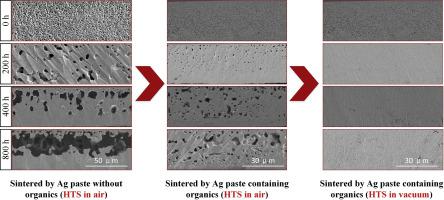当前位置:
X-MOL 学术
›
Microelectron. Reliab.
›
论文详情
Our official English website, www.x-mol.net, welcomes your
feedback! (Note: you will need to create a separate account there.)
Stabilizing the sintered nanopore bondline by residual organics for high temperature electronics
Microelectronics Reliability ( IF 1.6 ) Pub Date : 2020-08-01 , DOI: 10.1016/j.microrel.2020.113727 Hongqiang Zhang , Hailin Bai , Qiang Jia , Wei Guo , Guisheng Zou , Lei Liu
Microelectronics Reliability ( IF 1.6 ) Pub Date : 2020-08-01 , DOI: 10.1016/j.microrel.2020.113727 Hongqiang Zhang , Hailin Bai , Qiang Jia , Wei Guo , Guisheng Zou , Lei Liu

|
Abstract When using nanopaste as bonding material, residual organics are inevitable in the sintered bondline and normally considered as having negative effects. This paper firstly finds that proper residual organics can stabilize the bondline microstructure which is very important for high temperature electronics. The results show that nanopores in the sintered bondline tend to coalesce during high temperature service and the pore size growing rate is much faster if no residual organics in the bondline. However, about 2.2 wt% residual organics can largely suppress the growing rate and almost cease the nanopore growing at 350 °C for 800 h. It is mainly because that the naturally uniformly distributed residual organics inhibit the nanopore surface diffusion.
中文翻译:

用于高温电子产品的残留有机物稳定烧结纳米孔粘结层
摘要 使用纳米膏作为粘结材料时,烧结粘结层中不可避免地会残留有机物,通常认为会产生负面影响。本文首先发现适当的残留有机物可以稳定胶层微结构,这对高温电子产品非常重要。结果表明,烧结胶层中的纳米孔在高温工作期间趋于聚结,如果胶层中没有残留有机物,则孔径增长速度要快得多。然而,大约 2.2 wt% 的残留有机物可以在很大程度上抑制生长速率,并且在 350°C 下几乎停止纳米孔的生长 800 小时。这主要是因为天然均匀分布的残留有机物抑制了纳米孔表面扩散。
更新日期:2020-08-01
中文翻译:

用于高温电子产品的残留有机物稳定烧结纳米孔粘结层
摘要 使用纳米膏作为粘结材料时,烧结粘结层中不可避免地会残留有机物,通常认为会产生负面影响。本文首先发现适当的残留有机物可以稳定胶层微结构,这对高温电子产品非常重要。结果表明,烧结胶层中的纳米孔在高温工作期间趋于聚结,如果胶层中没有残留有机物,则孔径增长速度要快得多。然而,大约 2.2 wt% 的残留有机物可以在很大程度上抑制生长速率,并且在 350°C 下几乎停止纳米孔的生长 800 小时。这主要是因为天然均匀分布的残留有机物抑制了纳米孔表面扩散。










































 京公网安备 11010802027423号
京公网安备 11010802027423号